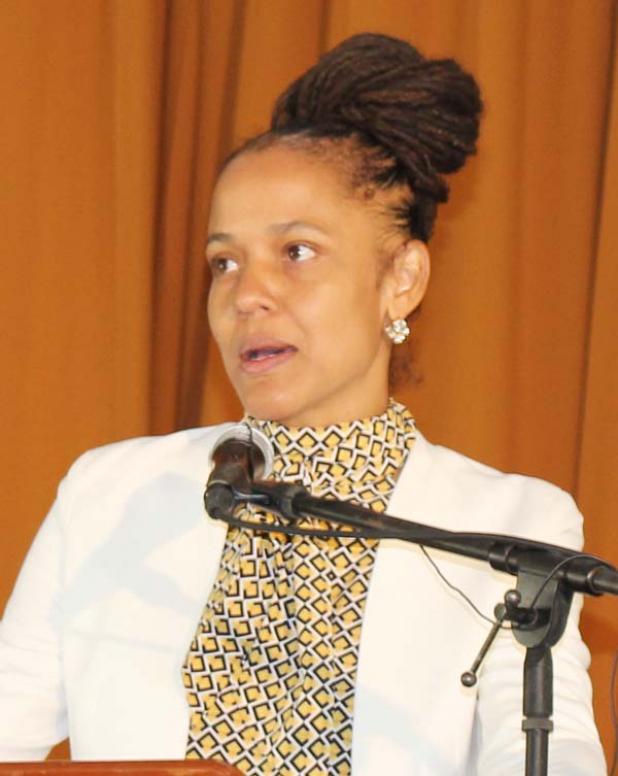
Acting Prime Minister and Minister of Education, Technological and Vocational Training, Santia Bradshaw.

Peace Ambassador, Ayra Newton (centre), with performers (from right) Philip 7, Mole, Faith and Peter Ram of the Anti-Violence Campaign jingle, which encourages dialogue between teachers and teachers; teachers and students; as well as students with students, after the official launch of the programme at the Princess Margaret Secondary School yesterday.
‘NOT WORKING!’
A new discipline policy is being developed by the Ministry of Education, Technological and Vocational Training to be implemented in schools across the country.
That’s the word from Acting Prime Minister and Minister of Education, Technological and Vocational Training, Santia Bradshaw, who said they have realised that “something about our punishment system is simply not working”. It is with that in mind that she hinted at probable changes in relation to corporal punishment. Her comments came as she delivered the feature address yesterday morning at the official launch of the Ministry’s new Anti-Violence Campaign for Nursery, Primary, Special and Secondary Schools at the Princess Margaret Secondary School.
“We have a system that has been based on corporal punishment in the schools. There have been some modifications to it, but I think many of us will agree that there are several studies that have shown that there are children who are at different levels, and sometimes the harsh punishment of physically punishing a child is simply not working,” she contended.
With that in mind, she said that in using corporal punishment, those inflicting the punishment, be they teacher or parent, may sometimes actually do more harm than good to the children in our educational system and across our households. Acknowledging such, the Acting PM said her ministry recognises the new approaches must be focused on discipline and that the essence of discipline is finding effective alternatives to punishment. Bradshaw said the most effective alternative is providing children with the skills needed to live in harmony with one another.
The Acting Prime Minister added that, “Taking a proactive approach is the first in the direction of change, the next step is finding ways to incorporate peacemaking skills into daily classroom activities. In other words, let’s make the ability to talk out things between teachers and students and students and students, the norm rather than the exception in our school environment.”
Speaking earlier, UNICEF Representative to Barbados and the Eastern Caribbean, Dr. Aloys Kamuragiye, also raised the issue of corporal punishment, listing it as one of three main types of school violence; identifying sexual abuse and bullying as the other two. His comments came as he referred to a 2014 study looking at disciplinary practices in schools in the Eastern Caribbean, which showed that 48 per cent of teachers used corporal punishment in schools and 42 per cent of them felt they would be perceived as soft if they did not use corporal punishment when children misbehave.
Meanwhile, Chief Education Officer Karen Best, delivering remarks at the event, also spoke of a behavioural policy that has been designed and will be implemented after consultation with stakeholders. Her comments came as she said that a Schools’ Positive Behaviour Management Programme (SPBMP) has been implemented in all schools, which has as its focus, developing frameworks for student-centred education, systems and schools that are characterised as inclusive, healthy, safe and productive. (JRT)
